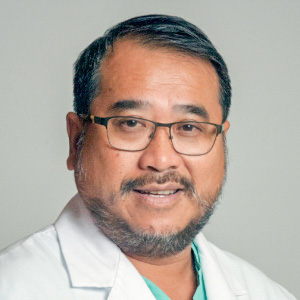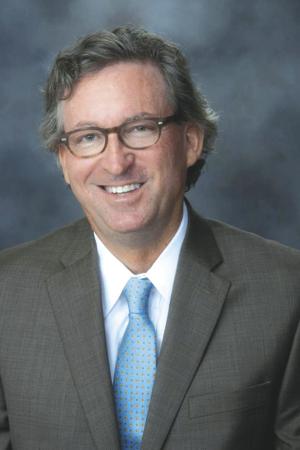Doctors group proposes to buy Weems
A group of physicians, headed by Port St. Joe resident Dr. Huy Nguyen, have recommended to Franklin County Commissioners a plan to convert the small critical access hospital in Apalachicola into the newly created Rural Emergency Hospital (REH) designation, and to enter into talks to have them purchase Weems from the county.
Nguyen, an emergency room physician who worked during the pandemic at Ascension Sacred Heart on the Gulf, outlined the “transformation and sustainability” proposal to commissioners March 19.
A former Navy doctor who served in Iraq in 2003, Nguyen is currently CEO of Doctors Memorial Hospital in Bonifay, and CEO and managing partner of North Walton Doctors Hospital in Defuniak Springs, which is set to become the first Florida hospital to become a REH under newly introduced state and federal legislation. That REH is designed to subsidize the conversion of small, struggling acute care hospitals into beefed-up emergency rooms with limited inpatient services.
Nguyen’s group interested in obtaining Weems include James McLoughlin, MD, a spine surgeon with offices in Tallahassee and Panama City, and physician owner at North Walton; Andrew O’Connell, chief financial officer at North Walton; Gary Gargus, a healthcare architect; Bryan Cherry, a health care lobbyist; and Christopher Ryan, with Phillips, a maker and distributor of healthcare devices.
North Walton “was an old hospital in Defuniak, basically in a death spiral, losing money, losing providers, and then it got worse and worse,” Nguyen said. “Me and other doctors have brought it back (to where it is) the first physician majority owned, managed and operated in this country in 15-plus years.”
He said the new ownership has reversed steep operating losses. “Critical to the turnaround is bringing in the latest technology,” Nguyen said. “They (patients) will see you when you’re using the best equipment.”
He outlined numbers for Weems that indicated steady net operating losses in the neighborhood of $3.3 million, which require an annual infusion of about $3 million in ad valorem and health care tax revenues in order for the hospital to stay afloat.
“With these kinds of operating losses it’s the only way this hospital has been sustained,” Nguyen said.
He said over the last two to three years, Doctors Memorial in Bonifay, also a critical access hospital, has under his leadership nearly doubled its revenue collection from $12.4 million to $21.4 million and been able to decrease its operating margin loss to 2.4 percent. “Any 3 percent, on either side of zero, is pretty much break even,” Nguyen said.
County Commissioner Anthony Croom cited data from a 2022 audit that indicated “serious concern about the deteriorating condition” of the Bonifay hospital, but Nguyen defended the trend of the numbers.
“It’s going to be a lot better,” he said. “I’m happy to share raw data. If I didn’t know how to turn around a distressed hospital I wouldn’t be here. Bonifay was truly in a death spiral.”
Nguyen told Croom he has “no doubt” the number of jobs at a reconfigured Weems would increase. “I don’t know the wage scale here but I know there’s been a loss of staff,” he said. “We’ll have to readjust the wage scale upwards.”
Nguyen said transforming Weems from a critical access hospital to a REH would be wise for commissioners to pursue.
“This is your classic situation that this designation was designed to save. Right now you guys are effectively a kind of a REH anyway,” he said. “With two to four inpatients, you don’t have a robust inpatient now.
“With a REH, we will keep a patient overnight on observational status, and 95 percent of the patients are either discharged home or kept overnight in observational status,” Nguyen said. “The biggest advantage is doctors can work there and be owners.”
He said reconfiguring the emergency room would cost anywhere from $3.6 million to $6.3 million, much less than building a new hospital, and could be completed over a period of six to nine months of construction.
Nguyen said his physician group would be willing to outfit the new emergency room with state-of-the-art equipment.
“Gulf County no longer has an MRI (magnetic resonance imaging),” he said. “You get an MRI and you’d be the only MRI between Tallahassee and Panama City. What if you can make the argument you’re probably better than Port St. Joe?”
Nguyen said he envisions bringing in cardiology services and a complete corporate rebranding. “If you don’t bring in good doctors, you’re throwing a ton of money after bad.”
While he did not discuss hard numbers as to what the price for Weems would be, he presented two scenarios. “If the county was to divest itself out of Weems we would be willing to take on financial risk to make this transformation happen,” Nguyen said.
He said under consideration could be a public private partnership where the county has minority ownership with a physician consortium that would assume all risks for this transformation, “The county if it wants could be a partial source of financing and make interest,” Nguyen said. “And we’d have a community support foundation so that we are ensured we meet the needs and input of the community.”
He said the alternative model could be a “pure physician owned and operated hospital. My name is a personal guarantee on a ton of money. I’m grateful that I also have peers who are personal guarantees of a lot of money. I know we can finance this.”
Nguyen noted that if the county commences talks along those lines, he would like a stipulation put in prior to talks. “I would ask that there be a penalty on either side if we don’t end up signing a letter of intent,” he said. “Think of it kind of as an engagement. I’ve never been left at the altar but I know it can happen.”
Before responding to commissioners’ questions, Nguyen summarized by saying “You guys have a hospital that in my mind is in a death spiral. There’s a new hospital classification that you can take advantage of and you can do it without physician ownership.
“If you don’t have the right management and you don’t have the right providers, you’re just now going down another rat hole,” he said. “I believe we have a template, a model of physician ownership that can transform this hospital and we’re willing to look at it.”
Commissioner Ottice Amison asked about the two clinics that Weems operates and Nguyen said that they would be part of their purview as well.
“The clinics would be part of this, and would be part of a 90-day transition,” he said. “We have to address ambulance services, as well as all the clinics, and we’re committed to a clinic system because that’s how you feed the main hospital.
“One way to recruit primary care physicians is to sell the beauty of the region and then dangle physician ownership in front of them,” Nguyen said.
Commission Chairman Ricky Jones said he would be interested in holding an evening workshop to gather community input on the doctors’ proposal. Meanwhile, the county is pursuing a request for qualifications for a healthcare consultant, not interested in operating Weems, to provide them advice on going forward with an REH and other management issues over the hospital.





Meet the Editor
David Adlerstein, The Apalachicola Times’ digital editor, started with the news outlet in January 2002 as a reporter.
Prior to then, David Adlerstein began as a newspaperman with a small Boston weekly, after graduating magna cum laude from Brandeis University in Waltham, Massachusetts. He later edited the weekly Bellville Times, and as business reporter for the daily Marion Star, both not far from his hometown of Columbus, Ohio.
In 1995, he moved to South Florida, and worked as a business reporter and editor of Medical Business newspaper. In Jan. 2002, he began with the Apalachicola Times, first as reporter and later as editor, and in Oct. 2020, also began editing the Port St. Joe Star.